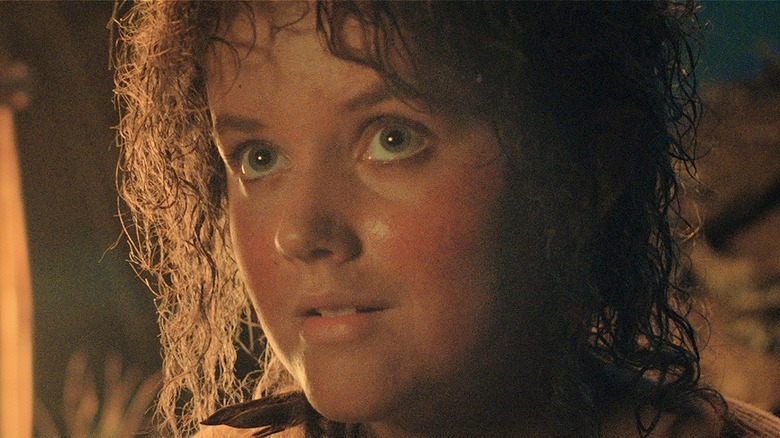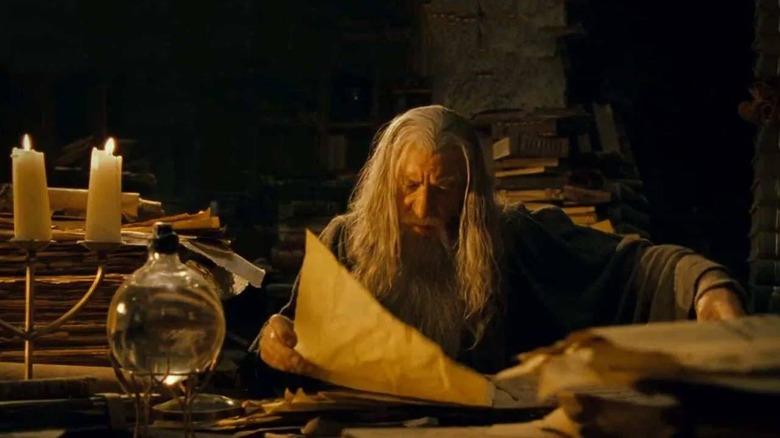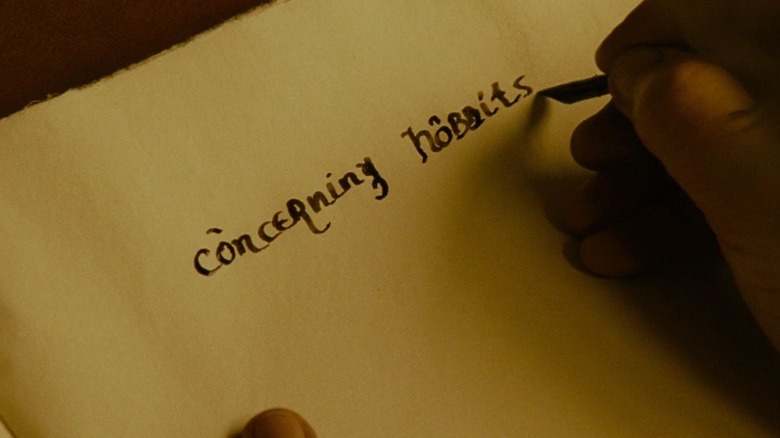Amazon's The Rings Of Power Confirmed To Draw A Key Detail From Tolkien's Appendices
The release date for Amazon Prime Video's "The Lord of the Rings: The Rings of Power" is drawing nearer by the day, and with it, a steady stream of slow-burn reveals by the streamer. The latest in this growing snowball of information is a story that digs deep into an area of J. R. R. Tolkien's world that is equal parts essential and subtle.
On June 16, Inverse shared an exclusive interview with the "Rings of Power" dialect coach Leith McPherson, whose primary job the publication describes as "coaching the show's actors into inhabiting the voices of their characters." McPherson herself has an impressive and fascinating résumé (more on that in a minute) but her comments on the upcoming "Rings of Power" experience are of particular note. One thing the dialect expert particularly honed in on was the fact that the show is pulling out all of the stops when it comes to incorporating one particular detail from Tolkien's appendices.
Tolkien's entire world revolved around language
During her interview with Inverse, Leith McPherson gave plenty of insights into a few language-specific sections of the appendices located at the end of J. R. R. Tolkien's "The Return of the King" that appear to have been front and center to her work as a dialect coach on "The Rings of Power."
Tolkien was a philologist (per The New York Times). No, that isn't a fancy medical term or a word describing a strange, viscous throat condition. It's an academic field of study that focuses not just on the spoken word, but the history, development, structure, and relationships of languages themselves. Not surprisingly, the ability to be a dialect coach on the set of a Tolkien project carries uniquely special weight, and McPherson is clearly aware of that. She singles out the appendices of "The Lord of the Rings" as a place where Tolkien speaks right to her.
Those appendices consist of six sections titled A through F. They cover everything from timelines and family trees to brief chronological histories to the story of Aragorn and Arwen ... as well as languages. There is a lot in there about language and speech in Middle-earth.
Throughout these appendices, Tolkien (as the narrator) remains an in-story and unbiased observer. Hence, he starts Appendix E (which McPherson specifically highlights) with the line: "The Westron or Common Speech has been entirely translated into English equivalents." He goes on to describe how to pronounce consonants and vowels, what letter combinations are diphthongs (i.e. pronounced as a single syllable), and where to stress words. This is the playground within which the author thrived, and it's the primary element that gives his world its distinctly deep flare.
According to McPherson, this linguistic source material is where the show will really strive to honor Tolkien's work.
Bringing language to The Rings of Power hasn't been easy
Language is such an important part of Middle-earth that, in the foreword to "The Fellowship of the Ring," J. R. R. Tolkien literally states that his world is inspired by language and "was begun in order to provide the necessary background of 'history' for Elvish tongues." Talk about a pet project within a pet project.
This obsession with and love for language is something that Leith McPherson is more aware of than most. According to her Inverse profile, the dialectic coach herself got her started by spending a dozen years helping actors in the London theater scene. She also spent time on the set of Peter Jackson's "The Hobbit" films helping actors to both speak Tolkien's languages and develop their own in-world-appropriate accents. She's back at it, once again, with "Rings of Power." This time, though, the challenge is much bigger.
The speech coach highlights the High Elvish speech of Quenya as a good example of the challenge. She points out that it is like "Elvish Latin" (read: a dead language) by the time of "The Lord of the Rings." During "Rings of Power," though, it's alive, well, and commonplace.
McPherson also discusses the challenge of bringing different languages to life. Orcish, for instance, she describes by saying, "It should feel awful to speak and to hear. It's guttural. It's harsh. It's full of rough consonants ..." When discussing Dwarvish, she says it "evokes their very solid present. It's beautiful but there is a rougher quality, a feeling of weight."
The Rings of Power will honor Tolkien's work through words
Throughout this process of expanding J. R. R. Tolkien's world (a necessary activity for a story in the underdeveloped Second Age), Leith McPherson continues to point back to the author as her North Star. She refers to this throughout the Inverse interview. Early on, she calls Appendix E of "The Return of the King" her template, adding, "That's my touchstone. That's my home. I try to be an ambassador for his work as much as I can."
At another point in the interview, she adds that she's excited to be part of creating the auditory experience, in particular. "Hundreds are focused on the visual [elements]," McPherson explains, "but here is this little team focused on making the auditory experience rich and varied, a kind of signpost as we move from place to place."
The line that really speaks to McPherson's devotion to Tolkien, though, is when she explains how she sees herself as an archaeologist and anthropologist who is working with the Tolkien estate to preserve what the author created and build on what he never got around to.
"There are pathways, descriptions for sounds Tolkien set," the dialect coach explains, "We are honoring his work. We're not venturing so far off the map that Tolkien himself hasn't given scope for it. At the same time, we have flexibility to create, to be creative with the aural." While there is obvious respect in the words themselves, the ability to successfully walk the line between honoring the original and adding to the creation itself remains to be seen and heard. "The Lord of the Rings: The Rings of Power" drops on September 2nd.



